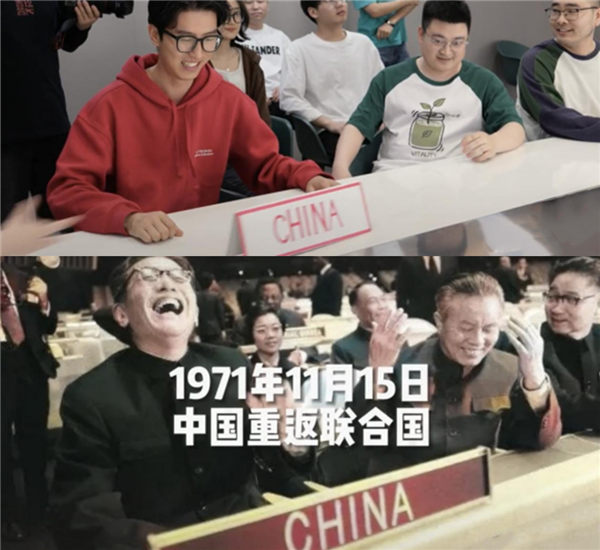

Recreating history
Recently, a distinctive type of video transition has gained traction across Chinese social media platforms. In these videos, vloggers replicate the poses, gestures, and settings of movie scenes or images, followed by the original clip or photo.
Initially prevalent in travel vlogs and costume change videos, this transition style has now evolved, with many Gen Zers reenacting significant moments from Chinese history portrayed in movies and documented graphics.
One such vlogger is "Zhangyiheng". His most acclaimed video, which recreates a scene from the 2017 Chinese movie The Founding of an Army, featuring the famous line "A single spark can start a prairie fire", has received more than 6.1 million likes on Chinese video platform Douyin.
Another popular video of his involves the recreation of the iconic image "Qiao's Laugh". This photo, taken in 1971, marked a significant milestone in Chinese diplomacy when Qiao Guanhua, then Vice Foreign Minister, laughed heartily as the People's Republic of China made its debut at the United Nations Assembly Hall.
"Zhangyiheng" wrote in one of his videos that their intention in creating these videos is to present these important moments in a fresh and engaging manner.
"This is a unique romance and patriotic sentiment among the Chinese people, serving as a way for our generation to express love for our country," a netizen commented.

Trash therapy
Have you ever wished you could simply discard negative emotions as easily as throwing away trash? Well, a study conducted in Japan suggests that this might be possible.
In this research, which was published earlier this month in the journal Scientific Reports, a team asked 100 college students to express their opinions on social issues, such as whether public smoking should be banned. Afterward, the students faced harsh criticism and were asked to write down their feelings on paper.
These infuriated students were then divided into two groups of 50: the "disposal group", who either shredded or threw away the paper, and the "retention group", who kept the paper in a clear folder or transparent box. The results showed that the anger of the disposal group practically vanished, while that of the retention group only slightly improved.
"We expected that our method would suppress anger to some extent. However, we were amazed that anger was eliminated almost entirely," Nobuyuki Kawai, a cognitive science professor at Nagoya University and lead author of the study, told The Times.
The research team believes that their findings could offer a unique approach to anger management.
So, the next time you're seething with anger, try writing down your feelings and then tossing them away.